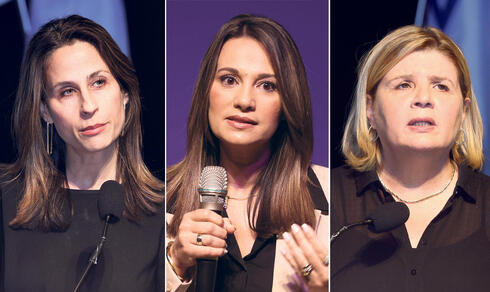
High-tech for all? Conference tackles high-tech worker shortage
“Let's bring the high-tech capabilities to the industry and to every man and woman everywhere in the country," said Israel’s Economy Minister Orna Barbivay at the "A Million to High-Tech" conference; Education Minister launches plan to teach spoken English from kindergarten
The “A Million to High-Tech” conference has set itself the goal of raising the issue of dealing with the shortage of skilled tech workers, with an emphasis on under-represented populations, such as women, the Arab sector and the ultra-Orthodox. The conference held last Thursday also saw the launch of the Anashim.IL innovation community, which focuses on education, learning and work, for the development of human capital in Israel.
1 View gallery


"A Million to High-Tech" conference (from left): Innovation Minister Orit Farkash HaCohen, Education Minister Yifat Shasha-Biton, Economy Minister Orna Barbivay
(Photo: Yariv Katz)
Economy Minister, Orna Barbivay, opened the conference and said: "This meeting is mainly a statement of intent: Let's do things together. Nobody has a monopoly on knowledge. The collaborations between government ministries, high-tech and industrial companies, start-ups, academia, associations and the third sector, government and local and of course teenagers, are all required to cross the content worlds and create an action plan that will lift the whole economy up. Let's bring the high-tech capabilities to the industry and to every man and woman everywhere in the country.”
According to Barbivay, "People are the whole story. How do we create an opportunity for a person born an hour's drive away from here? We understand that the way to reach the potential of a start-up nation is to expand the circle of partners and bring in more diverse populations." The Minister of Economy also referred to the crisis in the industry: "The news of layoffs in the high-tech industry, along with our desire to reach a million people in high-tech, requires us to pinpoint the way we develop knowledge, abilities and skills in all areas of life. For example those seeking junior positions are highly motivated to get into the high-tech world. We cannot afford not to open the professional gateway widely to them, and I intend to create programs that will encourage junior workers to integrate into the public sector as soon as possible.”
The Minister of Innovation, Science and Technology, Orit Farkash HaCohen, also referred to the importance of the next generation: "Yesterday we published the conclusions of the Perlmutter Committee, which I formed when I took office,” she said. "The committee convened for the first time all relevant sides to discuss a strategic issue for the State of Israel - maintaining the long-term success of the high-tech industry. The team's recommendations shined a spotlight on the urgent need to prepare the next generation for the world of employment of the future, while adapting to these needs."
Education Minister Yifat Shasha-Biton added the pedagogical dimension: "We are working to adapt the pedagogical system to the changing reality, and to get our children out of the system with the skills and tools they need," said Shasha-Biton, "so we are launching a number of programs, first and foremost is the matriculation reform that will affect the entire system, and will provide our children with relevant tools that will serve them later in their professional and personal lives such as teamwork and presentation. At the same time, next year, programs will begin in kindergartens around the country, where children will be exposed to both the high-tech worlds and to the spoken English language, which is also an important component when talking about high-tech.
“When we talk about high-tech and the education system, we always tend to look at things only from the prism of math or computer science, which are really important, but high-tech does not solely rely on them. We want to expose children to this world from an early age, in all forms."
First published: 13:11, 10.07.22













